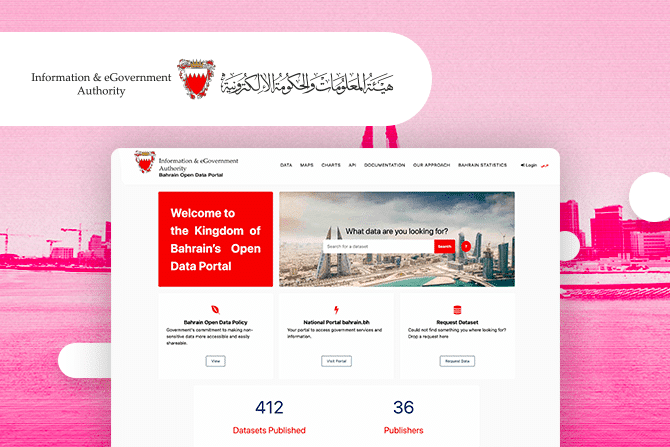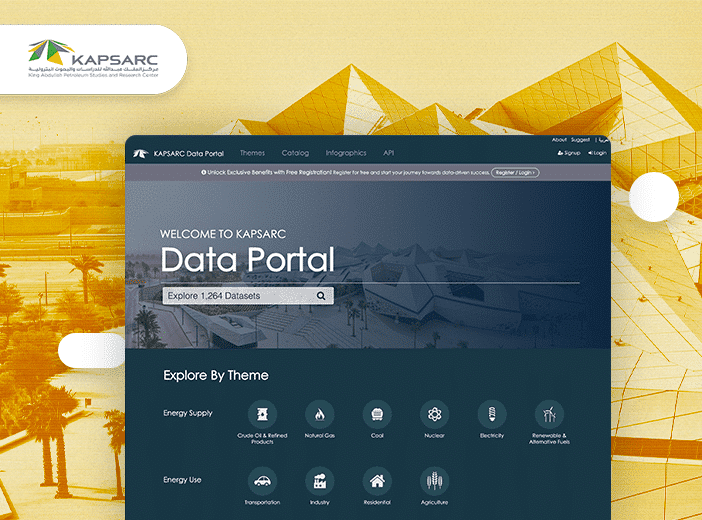Using data to drive innovation across the Middle East
The recent GITEX event in Dubai provided the perfect opportunity to understand how data sharing is changing across the Middle East. Based on our discussions, this blog highlights 5 key themes driving data use in the region.

The combination of far-reaching national digital strategies and growing private sector innovation is accelerating the use of advanced technology across the Middle East to increase efficiency, productivity, collaboration, innovation and transparency.
The recent GITEX 2024 exhibition and conference in Dubai highlighted the speed of progress to date, and the scale of ambitions for the future. The world’s largest tech and startup event, it saw record attendance in its 44th year, bringing together the global and local tech ecosystems for five days of meetings, presentations and showcases. As this blog explains, it provided the perfect opportunity to understand how data is driving transformation across the region, and to look at the future impact of data sharing on countries, businesses and government organizations.
5 themes for the future of data sharing in the Middle East
With a range of clients and partners in the region, Opendatasoft has been active in the Middle East for many years, supporting customers that include the Kingdom of Bahrain, the Emirate of Ajman, Qatar, the Royal Commission for Riyadh City, and research organization KAPSARC. From talking to our ecosystem at GITEX we’ve identified five key trends around changing data use in the region.
The public sector is moving beyond open data
Countries, especially in the Gulf Cooperation Council (GCC) have built strong, robust and comprehensive open data portals at the national level. These have had a major impact – for example Bahrain, Saudi Arabia and the United Arab Emirates all achieved a Very High ranking in the 2024 United Nations (UN) E-Government Survey.
Given these benefits, multiple other government organizations, such as ministries and agencies, are now looking at creating their own data portals in order to share information with their own key audiences. This requires a clear understanding of what these stakeholders are looking for, along with a personalized, intuitive user experience that connects them quickly to the data they need.
A further example of data innovation is from the King Abdullah Petroleum Studies and Research Center (KAPSARC), a leading advisory think tank focused on global energy economics and sustainability. It is sharing data with researchers across the globe, providing over 1,300 datasets in a range of formats, including maps, dashboards and other visualizations. It has seen usage increase to over 200,000 annual downloads, with visitors from 160 countries around the world.

Equally, organizations are looking to how they can monetize their data, increasing the value they and their audiences receive. This grows revenues through new data-driven services that in turn increase digitalization and innovation.
Data is being used in new and exciting ways within data marketplaces
Once collected and shared via a data portal or internal data marketplace, information spurs innovation. And, because it is available to all, anyone can harness it to deliver new uses. For example the data on the Emirate of Ajman’s data portal is powering a range of smart city applications across the country, as well as delivering vital information for investors and tourists. Based on this data, the Emirate has created an internal digital twin to model and optimize public services, forecasting the impact of population growth on the country.
At GITEX the Ajman Chamber launched the Ajman Investment Platform, which aims to provide comprehensive information and promote investment opportunities. It delivers added value to investors through comprehensive data and analytics that facilitate the identification of available investment opportunities, and is closely integrated with the existing Ajman Open Data Platform.
Another innovative use case is around sustainability and waste management, created through a collaboration between the Municipality & Planning Department and Digital Ajman. Delivered through an interactive, comprehensive data story, this provides citizens with information on how the emirate is handling sustainability and building a circular economy. It encourages citizens to recycle more and highlights the facilities that have been put in place to make Ajman more sustainable. Building on this, students have created their own waste management dashboards, helping deepen and increase sustainability efforts.

AI innovation: High-quality data sharing, not magic!
AI models require comprehensive, high-quality training data in order to operate effectively and without bias. Often, this foundational data comes from data portals, which have collected, enriched and quality checked information before it is published. This means that AI applications can be deployed with confidence to deliver innovation and greater efficiency.
As AI moves forward, organizations across the Middle East are looking to harness it to create high impact, concrete tools that solve specific pain-points. For example, the UAE Ministry of Education showcased a new tool illustrating how AI can help optimize school inspections, from ensuring complete data gathering to planning workloads to increase efficiency.
Building more agile data stacks
Organizations have invested heavily in their data infrastructures, and are looking at how they can maximize ROI from their technology. As part of this we presented with our partner Snowflake during Data Centre Universe Thursday, a day dedicated to exploring the future of data management and infrastructure. Our joint demo on ‘Collaboration and Monetization of Data Projects – the Role of the Data Marketplace’ got great feedback and led to a number of interesting conversations.
Smart cities are becoming smart ecosystems
The Middle East is leading the way when it comes to innovative, digital smart cities, from Saudi Arabia’s futuristic NEOM initiative to a host of other projects focused on improving services for citizens and communities while increasing transparency. A key theme at GITEX was the expansion of smart city ecosystems. From focusing on data produced by the city itself, authorities are now partnering with other public and private sector organizations, such as utilities and transport providers. This enables them to deliver a more comprehensive, unified experience to all audiences, cross-referencing and combining information to create smart ecosystems that deliver on key objectives around customer-centricity, launching innovative new services and meeting goals around sustainability and efficiency.
In Bahrain, the Kingdom’s portal brings together information from multiple government departments to improve collaboration, boost efficiency, and save time. For example, the Ministry of Works, responsible for roads and infrastructure, can now easily
access geospatial and demographic information on population and existing energy, water, and telecoms infrastructure, via the portal, without needing to request it from different departments. This streamlines the process of planning new construction, increasing productivity and reducing time and cost.

Demonstrating the key role of data across the Middle East
With representatives from more than 6,500 global firms, and 180 countries attending, GITEX Global was the perfect opportunity to connect with industry leaders from big tech, global governments and innovative startups, see the newest innovations, and make new connections. It reaffirmed the importance of data to accelerating transformation across the region, and the central role of data portals and data marketplaces in delivering successful digitalization and new services. We look forward to the next edition!



